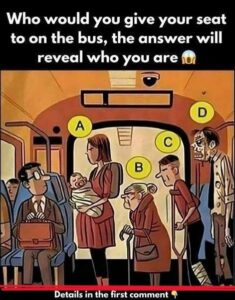What Your Bus Seat Choice Might Secretly Reveal About You

Have you ever stopped to think about what your smallest, everyday choices say about you? Sometimes, it’s not the big, life-changing decisions that show our true nature, but the quiet moments—like deciding whether to give up your seat on a crowded bus.
Psychologists often use a thought exercise known as the “Bus Seat Dilemma” to explore this very idea. It’s a simple scenario with surprisingly deep insights: when there’s only one empty seat left, who should get it?
Picture this—you’re sitting on a jam-packed bus, and four people are standing nearby:
-
An elderly man struggling to stay steady.
-
A young, pregnant woman.
-
Someone with crutches nursing an obvious injury.
-
A parent trying to hold a toddler and bags of groceries.
You can only offer the seat to one person. Who do you choose?
The beauty of this dilemma is that it cuts straight to your instincts. There’s no time for overthinking—your first choice often reveals your natural priorities. Offering the seat to the elderly may point to respect for experience and tradition. Helping the injured could show you value immediate, practical help. Giving it to the pregnant woman might highlight your instinct to protect new life, while helping the parent could signal empathy for those juggling multiple responsibilities.
There’s no universally “right” answer here. Instead, it’s a mirror reflecting your values, ethics, and even unconscious biases. The real takeaway isn’t about who deserves the seat—it’s about why you chose the way you did.
Next time you’re faced with a similar situation in real life, you might find yourself pausing—not just to decide what’s fair, but to notice what that choice says about you.